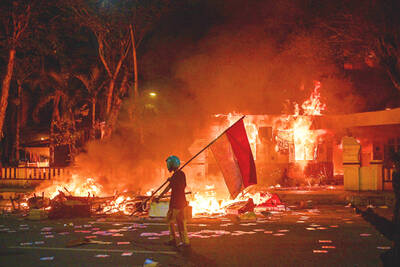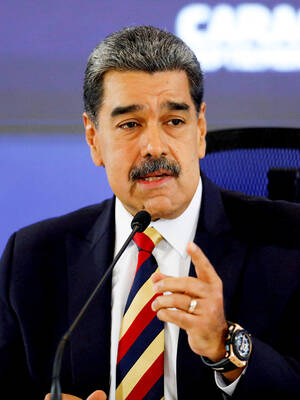Tributes poured in on Tuesday from across Latin America following the death of former Uruguayan president Jose “Pepe” Mujica, an ex-guerrilla fighter revered by the left for his humility and progressive politics.
He was 89.
Mujica, who spent a dozen years behind bars for revolutionary activity, lost his battle against cancer after announcing in January that the disease had spread and he would stop treatment.

Photo: AFP
“With deep sorrow, we announce the passing of our comrade Pepe Mujica. President, activist, guide and leader. We will miss you greatly, old friend,” Uruguayan President Yamandu Orsi wrote on X.
“Pepe, eternal,” a cyclist shouted out minutes later, while passing government buildings.
Mujica earned the moniker “world’s poorest president” during his 2010-2015 presidency for giving away much of his salary to charity and living a simple life on his farm, with his fellow ex-guerrilla wife and a three-legged dog.
The government announced three days of national mourning and said that his body was to be taken to the legislative palace yesterday to lie in state.
Activists from Mujica’s Movement of Popular Participation gathered outside the party’s headquarters to make giant banners marked “Hasta siempre, viejo querido” (“Until forever, old friend”).
Leaders from across Latin America and Europe paid tribute to the man described by Mexican President Claudia Sheinbaum as an “example for Latin America and the entire world.”
Brazilian President Luiz Inacio Lula da Silva echoed that message.
“His human greatness transcended the borders of Uruguay and his presidential mandate. The wisdom of his words formed a true song of unity and fraternity for Latin America,” Lula said in a statement.
At the Madison, an unassuming corner cafe in central Montevideo, waiter Walter Larus recalled Mujica popping in for a steak shortly after winning office.
“He felt and lived like ordinary people, not like today’s politicians who seem rich,” the 53-year-old waiter said.
In a 2012 interview, Mujica denied being poor, saying that his was, rather, a life of “austerity.”
“I need little to live,” he said.
He transformed Uruguay, a prosperous country of 3.4 million people best known for soccer and ranching, into one of Latin America’s most progressive societies.
In later life, he was disappointed at the authoritarian drift of some governments, accusing repressive leaders in Venezuela and Nicaragua of “messing things up.”
He was diagnosed with cancer of the esophagus in May last year and it spread to his liver.
His wife, Lucia Topolansky, earlier this week said that he was receiving palliative care.

‘NEO-NAZIS’: A minister described the rally as ‘spreading hate’ and ‘dividing our communities,’ adding that it had been organized and promoted by far-right groups Thousands of Australians joined anti-immigration rallies across the country yesterday that the center-left government condemned, saying they sought to spread hate and were linked to neo-Nazis. “March for Australia” rallies against immigration were held in Sydney, and other state capitals and regional centers, according to the group’s Web site. “Mass migration has torn at the bonds that held our communities together,” the Web site said. The group posted on X on Saturday that the rallies aimed to do “what the mainstream politicians never have the courage to do: demand an end to mass immigration.” The group also said it was concerned about culture,

CRACKDOWN: The Indonesian president vowed to clamp down on ‘treason and terrorism,’ while acceding to some protest demands to revoke lawmaker benefits Protests in Indonesia over rising living costs and inequality intensified overnight, prompting Indonesian President Prabowo Subianto to cancel a planned trip to China, while demonstrators reportedly targeted the homes of the finance minister and several lawmakers. Rioters entered Indonesian Minister of Finance Sri Mulyani Indrawati’s residence near Jakarta early yesterday, but were repelled by armed forces personnel, Kompas reported. Items were taken from the homes of lawmaker Ahmad Sahroni and two others, according to Detik.com. The reports of looting could not be independently verified, and the finance ministry has not responded to requests for comment. The protests were sparked by outrage over

VENEZUELAN ACTION: Marco Rubio said that previous US interdiction efforts have not stemmed the flow of illicit drugs into the US and that ‘blowing them up’ would US President Donald Trump on Wednesday justified a lethal military strike that his administration said was carried out a day earlier against a Venezuelan gang as a necessary effort by the US to send a message to Latin American cartels. Asked why the military did not instead interdict the vessel and capture those on board, Trump said that the operation would cause drug smugglers to think twice about trying to move drugs into the US. “There was massive amounts of drugs coming into our country to kill a lot of people and everybody fully understands that,” Trump said while hosting Polish President

A French couple kept Louise, a playful black panther, in an apartment in northern France, triggering panic when she was spotted roaming nearby rooftops. The pair were were handed suspended jail sentences on Thursday for illegally keeping a wild animal, despite protesting that they saw Louise as their baby. The ruling follows a September 2019 incident when the months-old feline was seen roaming a rooftop in Armentieres after slipping out of the couple’s window. Authorities captured the panther by sedating her with anesthetic darts after she entered a home. No injuries were reported during the animal’s time on the loose. The court in the